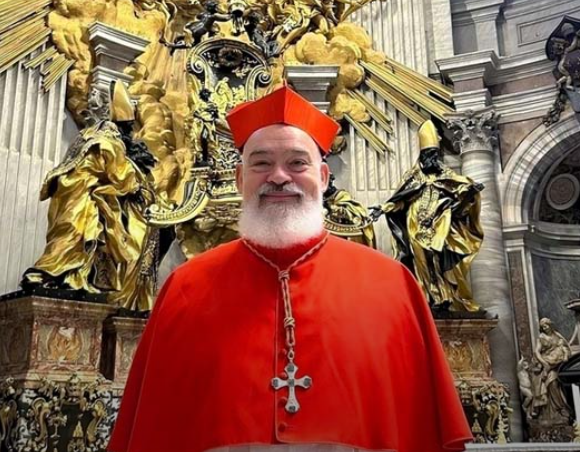In first ever, Archbishop of Tehran Mathieu among the Pope's electors
A Franciscan of Belgian origin, he received the cardinal's red hat on 7 December during the last consistory. The Iranian Church is a ‘peripheral’ reality, a small flock that is ‘transparent’ in its faith. Criticism of those who harbour a ‘preconceived’ view of a nation rich in ‘contrasts’. The desire to train ‘local pastors’.
Vatican City (AsiaNews) - A ‘small minority’ that must ‘remain’ in the country despite the difficulties, to bear witness to what Pope Francis called the ‘Church of 0,...’.
Even if, at times, the doors of places of worship ‘remain closed, and this is sad’. This is how Cardinal Dominique Joseph Mathieu, Latin Rite Archbishop of Tehran-Ispahan, elevated to the rank of cardinal on 6 October, described to AsiaNews the small Iranian Catholic community which, for the first time in its history, will now be represented in a conclave.
Although they have to move ‘on very slippery ground,’ he explained, the essential thing is to maintain a presence because ‘even where the door is closed, the important thing is that there is always a door. Because a door is always an invitation to enter, in the time established by God.’
Dominique Joseph Mathieu, Archbishop of Tehran-Isfahan, was born on 13 June 1963 in Arlon, Belgium. After high school, he entered the Order of Friars Minor Conventual and made his solemn profession in 1987.
Ordained a priest on 24 September 1989, he has been incardinated in the Provincial Custody of the East and the Holy Land since 2013, and over the years has held various positions: vocational promoter, secretary, vicar and provincial minister of the Belgian Province of the Friars Minor Conventual, rector of the National Shrine of St. Anthony of Padua in Brussels and director of the related Confraternity.
Assigned to Lebanon in 2013, in the Provincial Custody of the East and the Holy Land, he was Custodial Secretary, Formator, Novice Master and Rector of Postulants and Candidates.
Over the years, he developed a deep sensitivity towards dialogue with the Muslim world. On 8 January 2021, he was appointed archbishop, with Pope Francis' significant choice to add the name of the capital Tehran to the traditional seat of Isfahan. The consecration was celebrated on 16 February, the feast of St Maruthas, patron saint of Iran, in the Basilica of the Twelve Apostles in Rome.
It was only several months later that he was able to take possession of his see, where he made his entrance on 12 November after receiving permission from the Iranian authorities. Among his duties, since 11 January, he has also been a member of the Congregation for the Causes of Saints.
There are about 22,000 Catholics (about 500,000 Christians) in Iran out of a total population of nearly 82 million, the vast majority of whom are Shiite Muslims (90%, with Sunnis accounting for just over 5%).
Among the various Churches are Chaldeans, Armenians and Latin Rite faithful, in addition to Europeans and Latin Americans working in the Islamic Republic.
According to the Iranian Constitution (Art. 13), Christians, Zoroastrians and Jews are free to practise their religion ‘in accordance with’ Islamic law. Christians also have representatives in Parliament (Majlis).
Despite being a Church on the ‘periphery’, Iran is not a ‘forgotten’ reality, the cardinal said, as demonstrated by Pope Francis' decision to appoint him cardinal.
In these three and a half years at the helm of the Latin Rite Catholic community in the Iranian capital, he has been able to appreciate a ‘very lively reality, which despite difficulties [for example, it is not possible to have new priests, ed.] has been able to find a way to live a certain form of synodality’.
There are also, he adds, ‘good relations between Latin Rite Catholics and Assyrian-Chaldeans and Armenians, even though the latter are ethnic Churches and, as such, can only receive faithful belonging to that specific rite.’
Speaking of Iran, the cardinal recounts a ‘preconceived vision’ of a country ‘full of contrasts’ in which ‘the population suffers most because of the economic embargo and [Western] sanctions in force, which are causing serious problems.’
However, diplomacy has been at work for several weeks to avert further regional conflict, in a context of deep tension between the Islamic Republic and Israel, supported by the United States.
‘With President Masoud Pezeshkian, there is also an attempt,’ Cardinal Mathieu confirms, ‘for greater dialogue and rapprochement with the West itself.’
On the pastoral level, the goal of the Archbishop of Tehran-Isfahan is to ‘train people to take responsibility for the local Church, even if it will take time, because we are - or must be - the leaven of this land.’ In this perspective, the cardinal invites us to ‘make available our wealth of followers of Christ, to be unconditional love and mercy. To paraphrase St. Francis, when we cannot bear witness with words, let us do so with our lives: I believe this is what is expected of Christians here. Finally, the important thing, concludes Cardinal Mathieu, is to affirm our presence in a transparent way, without hiding anything of who we are.’







.png)










